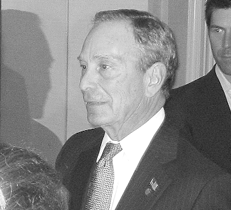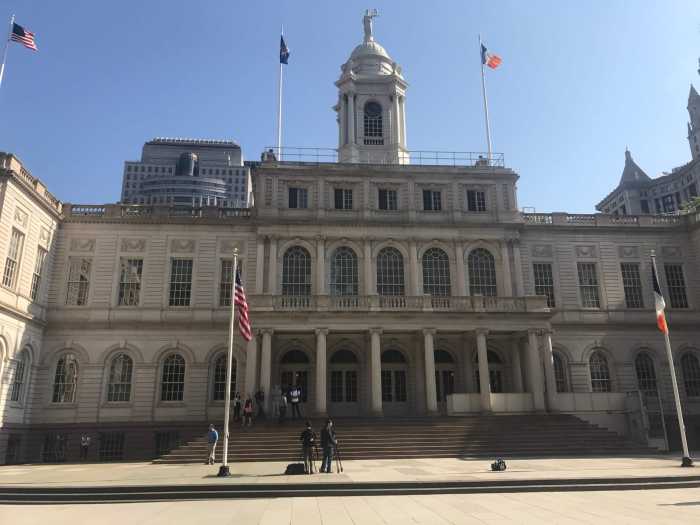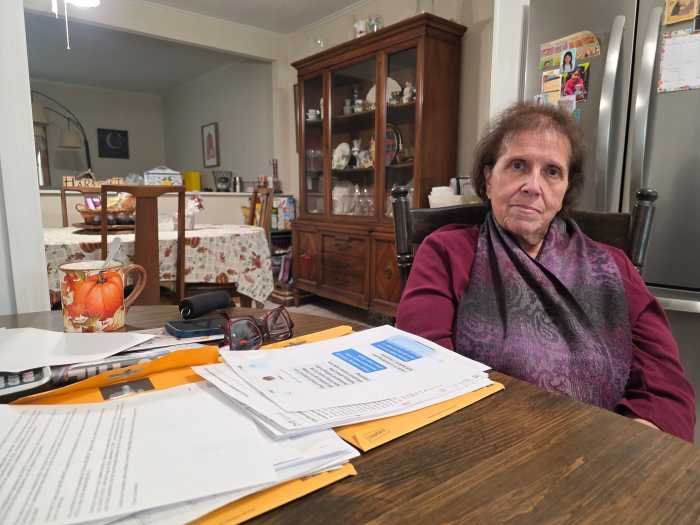Comparing the records of New York’s mayoral candidates on key LGBT issues
The election for mayor is Tuesday, November 8. Like all New Yorkers, lesbian, gay, bisexual, and transgendered voters will base their decision between Republican Mayor Michael Bloomberg and Democratic challenger Fernando Ferrer, the former Bronx borough president, on a wide array of issues—from public safety to education, housing, jobs, and how reliable city services are in their neighborhood.
Heck, maybe some gay voters even wonder whether they would rather share a cerveza with Freddy or with Mike.
The LGBT community, over the past several decades, has developed a broad public agenda, on which each of the two candidates has taken stands, made decisions, committed to action, and sometimes been missing in action. Bloomberg’s and Ferrer’s positions and actions on key issues are outlined below.
Where They Disagree Same-Sex Marriage
FERRER: Came out for full marriage rights for gay and lesbian couples in 1996 and has consistently supported that position since then.
BLOOMBERG: Vague position until 2005, at times even deriding the importance of marriage—based on his own experience with the institution. In the wake of February’s state court ruling ordering the city clerk to issue same-sex marriage licenses, voiced his support for gay marriage, even while appealing the ruling. Committed to lobby for gay marriage law in Albany should his appeal prevail in the Court of the Appeals, but has taken no steps on that pledge to date. Signed a law recognizing same-sex marriages, civil unions, and domestic partnerships performed elsewhere, and approved city pension and health care benefits for gay couples legally married elsewhere.
Same-Sex Marriage Lawsuit
FERRER: Committed to immediately dropping the city’s appeal of Manhattan Supreme Court Justice Doris Ling-Cohan’s February 2005 order that the city clerk issue marriage licenses to gay and lesbian couples, enabling same-sex couples from all over the world to marry in New York City.
BLOOMBERG: Appealed the February ruling, denying gay couples the right to begin getting married. Said it would cause “chaos” for the couples if he allowed them to marry only to have those marriages invalidated years later. Argued in court that only the Legislature can allow gays to marry, but has refused to lobby for a state bill that would open marriage to same-sex couples, saying he will not do so until the courts “resolve” the issue. Congressman Barney Frank, the gay Massachusetts Democrat, called Bloomberg’s appeal “terrible for us” because it prevented the community from strengthening its hand for the ultimate showdown on gay marriage statewide at the Court of Appeals with the weight of legally married New York gay and lesbian couples going about their lives.
Equal Benefits Law
FERRER: Supports this law that requires city contractors to provide domestic partners of their employees the same benefits that they give the spouses of their workers. Would drop the city’s court case to overturn it.
BLOOMBERG: Flip-flopped on the issue, in several stages. During a meeting in the summer of 2001, months in advance of his election, with the LGBT media, promised to enact this measure and even stare down New York’s Catholic archbishop over any attempt at a religious exemption. Soon modified stance to allow religious group and “possibly others” a carve-out out from ordinance’s provisions. At the annual dinner of the Empire State Pride Agenda in October 2002, announced opposition to the measure, saying that the city’s only obligation in procurement was to get the best service at the best price. Vetoed bill when it passed, saw his veto overridden by the City Council, and went to court arguing that the law is “illegal” under state law and the city charter. Prevailed in front of the conservative Appellate Division and is defending city’s win at the Court of Appeals, New York’s highest. Has gone on record saying that city procurement policy “should never be used to advance social causes,” including the way it was employed against the former apartheid regime in South Africa in the 1980s.
Aids Education In Schools
FERRER: Was a strong supporter, during the debate over the proposed Children of the Rainbow public school curriculum, of explicit, age-appropriate AIDS education in 1991 through his appointee to the Board of Education, Ninfa Segarra. She later broke with Ferrer—who as borough president was powerless to replace her—and aligned herself with Rudy Giuliani, then a Republican candidate for mayor, and voted to ban condom demonstrations in classrooms. Pledges to implement the AIDS education already mandated by law, including lessons on the safe use of condoms.
BLOOMBERG: While students are required to receive six AIDS lessons annually, these virtually disappeared under Giuliani. Bloomberg did not reinstate them, despite his much touted success in gaining control over the schools by replacing the Board of Ed with a Department of Education that reports directly to the mayor. Refused to reinstate a policy allowing AIDS educators to perform condom demonstrations. The Department of Education has confirmed that a new health curriculum, including AIDS education, is ready to be implemented, but an announcement of its details is not expected until after the election. At a public forum on HIV and the gay community in March, Health Commissioner Thomas Frieden said of the curriculum under development, “I don’t know that we will be able to achieve everything that you would want or I would want.”
Dignity In All Schools Act
FERRER: Supports and would implement a city law passed over Bloomberg’s veto that mandates programming to combat bullying motivated by a variety of biases, including those based on sexual orientation and gender identity and expression.
BLOOMBERG: Opposes the law, saying it is “illegal” and refuses to implement it. Says he supports state Dignity for All Students Act, which takes the same approach, but which has for years been held up by the Republican leadership in the state Senate. Department of Education officials, even as they objected to the drafting of the legislation in the City Council, largely refused to cooperate in considering the problem of harassments in the schools, providing statistics indicating a miniscule number of such incidents, contrary to the view of nearly everyone knowledgeable about the problem.
Civil Rights Restoration Act
FERRER: Strongly supports this bill, just passed by the City Council, to strengthen the City Human Rights Law and add protections to protect registered domestic partners from discrimination.
BLOOMBERG: Administration testified against the bill in committee and the mayor is now “reviewing” the bill to decide whether to sign or veto before the deadline.
Last Year’s Presidential Race
FERRER: Supported Democrat John Kerry, who supported civil unions for same-sex couples while opposing same-sex marriage. Kerry opposed the proposed federal constitutional amendment to ban same-sex marriage.
BLOOMBERG: Supported Republican George W. Bush, pledging $5 million—and according to the New York Daily News, increasingly that total to $7 million—of his own money to fund the president’s nominating convention in New York. Bush wants to amend the federal constitution to limit marriage to unions of one man and one woman, a position with which Bloomberg said he disagreed.
Exclusionary Parades
FERRER: Has always honored the boycott of Manhattan’s annual St. Patrick’s Day Parade and others that exclude LGBT contingents.
BLOOMBERG: Marches in exclusionary parades, and attempts to compensate by participating in the LGBT-inclusive St. Patrick’s Day Parade in Queens.
Where They Agree Transgender Rights
FERRER: Supports.
BLOOMBERG: Signed the law adding “gender identity and expression” to the City Human Rights Law in May 2002. During 2004, criticism from transgender activists surfaced because guidelines for enforcing the law had not yet be issued, by those were forthcoming from the city Human Rights Commission late last year.
Judge John Roberts’ Nomination to the Supreme Court:
FERRER: Opposes.
BLOOMBERG: Opposes.
LGBT PRIDE PARADE
FERRER: Marches each year in Manhattan and helped launch an annual parade in the Bronx while borough president.
BLOOMBERG: Marches in LGBT Pride Parade in Manhattan, but like Giuliani, mindful of protests in years past staged in front of St. Patrick’s Cathedral, refuses to march the length of the parade, jumping in below 50th Street.
Record On LGBT Rights Prior To 2001 Highlights
FERRER: As a Bronx city councilman in 1986, supported the bill banning discrimination on the basis of sexual orientation in both committee and on the floor of Council, resisting intense pressure from the Catholic Archdiocese of New York demanding that the Catholic Democrat vote no.
BLOOMBERG: Generous donor to public health causes. His company, Bloomberg Media, gives its gay and lesbian employees domestic partner benefits, but that policy was implemented only about a year before he decided to run for mayor.
Lowlights
FERRER: After the gay rights bill passed in 1986, voted for an amendment exempting four-family homes, up from the two-family exemption standard for all other categories of the human rights law. Said the amendment was necessary to keep the coalition supporting the measure together. Mayor Ed Koch subsequently vetoed that amendment and the Council chose not to override.
BLOOMBERG: Generous funder of the Boy Scouts of America, which went all the way to the U.S. Supreme Court to defend its right to discriminate against gay members and leaders, though Bloomberg told the group he disagrees with the exclusionary policy.
gaycitynews.com




































